The Battle of the Sexes: An Interview with Angela Washko
by JillianSteinhauer
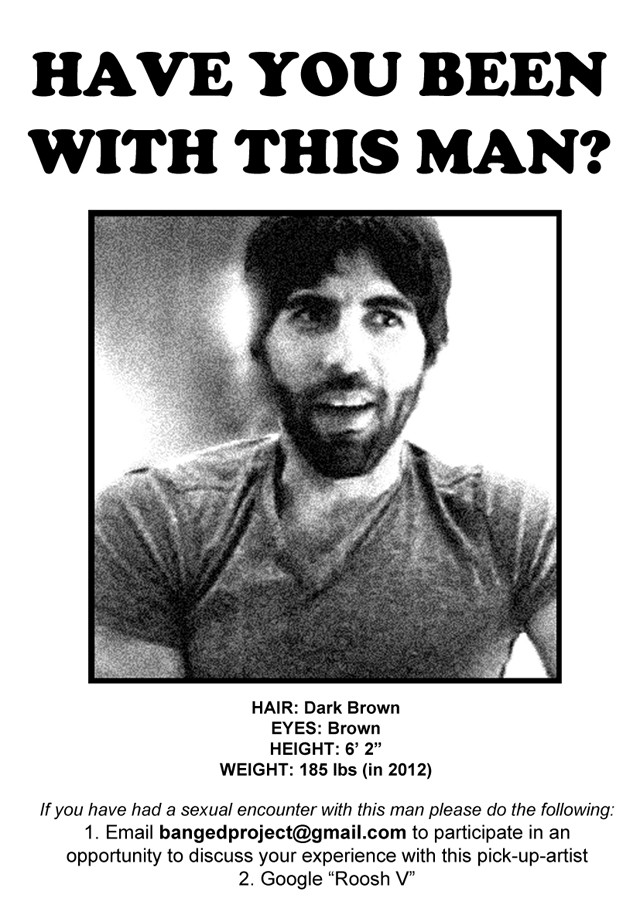
When I first encountered the work of artist Angela Washko, she was playing World of Warcraft on her own terms. Instead of slaying dragons, she was creating an artwork by way of social experiment: wandering around inside the game, she would use her avatar to initiate discussions with other players about feminism. “Would you mind telling me how you define feminism or what makes a feminist? :)” she would type. The responses would come: “I believe feminism is being a girl expressing hormones a certain way differing from a man”; “The same way you define maleism… its not fucking real”; and so on, while the characters jumped and danced and wiggled, and WoW’s melodramatic music swelled in my ears, giving the chat conversations a bizarre gravitas.
In her latest project, Washko is once again taking feminism to a place where it isn’t welcome but sorely needed: the land of pickup artists. For those unfamiliar, online pickup artist communities are theoretically spaces where men can learn the skills and gain the confidence necessary to pick up women. In reality, many of these forums, sites, and groups regurgitate the same misogynistic ideas.
As in all communities, pickup artists have their leaders. One of them is Roosh V., a blogger, self-described “love tourist,” and author of at least a dozen Bang books that claim to tell readers how to bang (or not) women, often by country (e.g. Bang Ukraine, Don’t Bang Denmark). In 2012, he was listed in a report of hate groups by the Southern Poverty Law Center.
Washko began reading Roosh V.’s writings in 2013 and became “obsessed.” She devised a plan: Roosh talks publicly about his conquests, so why not interview the women who’ve slept with him to get their perspectives on what it was like? Washko has only just begun her quest to find these women.
In the meantime, the project has already taken on a life of its own — she’s already had a two-hour Skype interview with Roosh himself. In it, he explains why he’s not a pickup artist, tells her she would look “more attractive” with long hair, and expounds on his sexist worldview: “By removing the dependency of women on men you’ve unleashed a can of worms where women no longer have to try. You know? They don’t have to be good, virtuous, noble, elegant, feminine.” Instead, he laments, they now get tattoos, burp, and gain weight. The horror!
Washko and I spoke over email about the experience of interviewing Roosh, how to go about finding women he’s banged, and the usefulness of empathy.
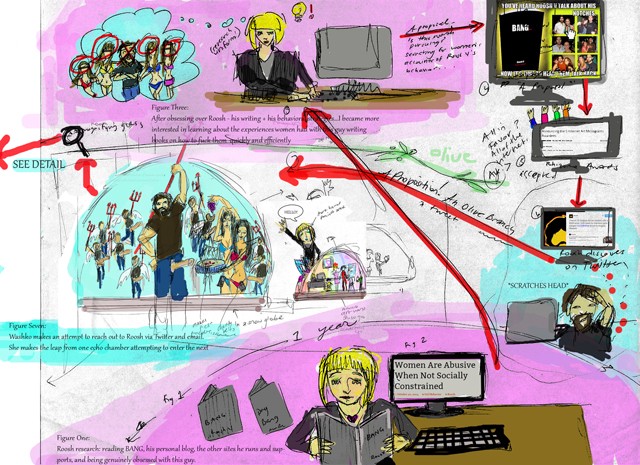
What was it like talking to him?
In your piece in Animal, you explain the process of falling down the Roosh V. “rabbit hole” and realizing you should interview him as part of this project. What fascinated you so much about his writings?
There are many things. Roosh is constantly working on his seduction processes in public. I actually admire how he puts himself in a position of vulnerability by writing with great immediacy and gives nearly equal real estate to his failures as he does his triumphs. He advocates for a pickup process that involves a high rate of failure and working toward overcoming fear of public humiliation, and I can definitely see the appeal for his audience.
I also became very interested in thinking about how a lot of Roosh’s writing advocated for more feminine, traditional, submissive women and more masculine, dominant, leadership-oriented men could be approached from a queer theory perspective, in which these are parts of a spectrum of possibilities in which none are violently imposed. Roosh was very opposed to this idea in our interview. Ideologically, we couldn’t disagree with each other more. He told me I need to stop being lazy and grow out my hair for the men in my life and that it is my biological imperative to quit working.
If looking at his texts from 2007 and 2014 individually you see him contradict himself (especially as he attempts to position himself farther away from PUA rhetoric), but as a chronology you clearly see someone who is working through a practice in front of an audience that has supported him and given him a platform to institutionalize it — through his books, the Roosh Method, and the websites he runs, including Return of Kings (a manosphere blog) and the recently initiated Reaxxion (a pro #gamergate support site for men).
Roosh’s background in industrial microbiology became quite interesting to me as well, and though he told me it has had no effect on his writing, I do wonder if somewhere it impacted his system of treating seduction as a methodology that can be broken down into numbers and pure strategy (see the Roosh Program), and is backed by “science, logic and reason” and the idea that all women at a base level have the same instinctual behaviors.
I got caught up in the fact that Roosh still thinks women are inherently emotional and lack the ability to process and produce logic, facts, and reason when one might argue that Roosh writes and acts quite emotionally. He writes entirely from his own personal experiences (something women writers are often criticized for) and rarely draws from statistical evidence, though occasionally he makes charts and graphs to elaborate on his personal discoveries (often confirmed by his insular community). People who ask questions about the lack of concrete evidence for these claims are supposedly living in bubbles where they can’t see objective reality and are dismissed as insular, overly educated, unrealistic feminists or Social Justice Warriors (SJWs — term borrowed from #gamergate movement). In our interview, Roosh stated that he has a more objective worldview than other people because he has lived (however briefly) in 30 countries and slept with women in most of them. I have become a bit obsessed with these lines of thinking in his practice, though I don’t feel like I can aptly explain that yet.
Without betraying Roosh’s trust, can you give any more details about how you convinced him to do an interview — a Skype one at that — with you?
Sure. It was through negotiation!
I noticed that he was aware of my project because he posted a link to its status as a finalist for the Rhizome Internet Art Microgrant on his Twitter account. I attempted to engage him there but didn’t have any luck. I figured if he did indeed look me up (which he claims he did not bother to do) he would be immediately turned off by my feminist practice. He gets a great deal of hate reportage, and though he has written about the benefits of his microcelebrity, the content of his work is a bit of an initial game-killer. More hate pieces ultimately don’t help his sexual pursuits.
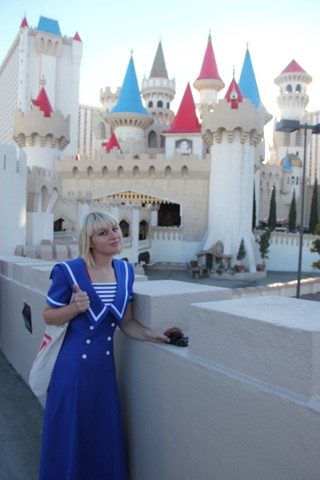
In my first email, I followed the protocols for emailing him as a woman outlined on the FAQ section of his personal website, sending a full body and face pic. I wrote that I was working on a project interviewing women who have had sexual exchanges with him and that it would be a better project if I could get his feedback on it and ask him a few questions in an interview over Skype. I also told him I was legitimately interested in how he ended up writing BANG, his methods, and the women he bangs. I mentioned that in my projects I tend to not necessarily take a dogmatic approach and am more interested in the complexities and nuances in his practice than whipping up another “Roosh is a fucking shitty misogynist asshole” piece. He didn’t care about any of those things.
In his response email he asked basically: what’s in it for him? If I were the New York Times or a big press outlet he would be interested, but he stated that his audience is already way bigger than whomever would see my work (at this point I still don’t know if he has ever looked up coverage on my work) and I would reap all the benefits and there was zero reward for him in doing it. At the end of this email he stated that unless I have hot girlfriends in Poland or Ukraine that he could potentially sleep with he had to politely decline. “No hard feelings.”
I agreed that my audience is small and said that even if my work gets discussed on major media outlets, I’m not writing for them, so it’s probably different. I then suggested that the work is already scheduled ultimately to be shown in gallery and museum contexts and that being shown in a museum may make him more culturally relevant and bang-able. I also offered him the full amount of my Rhizome grant (only $500, so not too much). I had the feeling he wouldn’t take the money because it might be emasculating.
He responded saying the museum sweetened the deal…but that it sounds like a lot of work and he’s busy with his video projects and moving to another country and finding a new apartment there. So he offered to answer a few questions over email and then put a video together on his end, stating that the quality on Skype would be horrible.
I then offered to send him a contract to make a deal about transfer of the money. I made several suggestions to cut down correspondence time to adhere to his busy schedule and also suggested that we’re not in a rush so he can do this at a time that works best for him. (Meanwhile he apparently has no awareness that I am teaching two classes at a research university, am enrolled in a graduate program, and am maintaining my own professional art practice and traveling the world to speak at conferences and install exhibitions and may have schedule restrictions myself). I also thanked him repeatedly and wished him luck apartment hunting.
He responded to me that he “does not want the money.” He also told me that making video is very time consuming (as a video maker myself, I am already quite aware of that), so he prefers to make a video for me that is 10 minutes long. He suggested that I send him questions via email first and then pick the ones I like best to go in his video. He told me to send him 1 or 2 questions per email at a time and that if he sees too many he will postpone.
I proceeded to read his text on how to deal with mainstream media, which clued me into his resistance to a live interview, which would have been much less time consuming for him overall. I do understand his desire to not be misconstrued or taken out of context, having also been on his end, doing a Skype interview with a news outlet that has selectively included and omitted sections to support an agenda.
I followed the format and sent him 1 or 2 questions per session. When I got one response from him, I would proceed to send him the next set of questions. He answered quite candidly and thoroughly for the most part. At the end of the process I asked him why he submitted himself to my questions in the first place. He wrote that he thought I was sincere about wanting to understand his views (which I am) and that he was enticed by being placed in a museum exhibit. He stated: “I also felt you would treat me fairly (as fairly as a woman could treat me, anyway).” He then asked what I would like from him for the video.
I made a list of my favorite questions/responses. He then offered to go ahead with the Skype interview after all — perhaps because making the video from all of those questions would be more work for him than doing an interview.
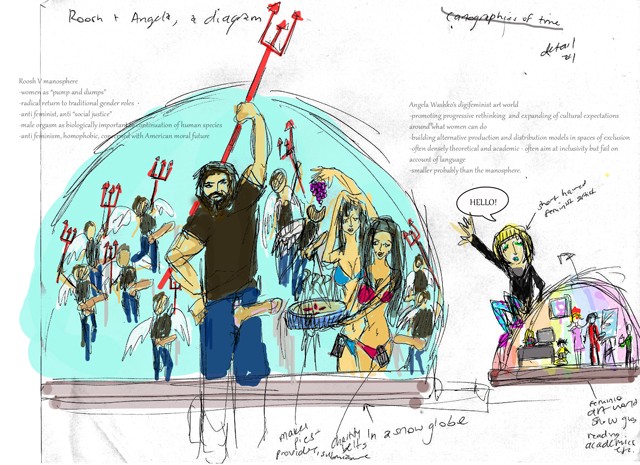
What was it like talking to him?
Well, I was very nervous — I knew he didn’t like to do in-person (video) interviews and has been very critical of being misrepresented or misconstrued by the media in the past. I was very sensitive to this, and even though I disagree with most of what he says and how he operates, I felt a commitment to represent him fairly — so I was nervous to ask questions that would touch on issues for which he gets slammed in the media. This happened for a brief moment when he didn’t want me to read a segment of one of his books out loud — but then he let me after I was apologetic and said I would allow him to clarify anything afterward.
He was immediately very performative and groomed his hair and adjusted his lighting to make sure he looked great for the “millions of people” that might see the interview. His performativity made me less nervous and reminded me to go into a more performative and less personal headspace. He mocked me from the beginning, making jokes about how small my audience is compared to his.
I tried to not let it be apparent that it was bothering me; I laughed too much throughout the entire interview as a way to deal with the feeling that I was not being respected. My experiences performing as a diplomat for so many years (though avatar-bound) in World of Warcraft and diffusing trolls therein was an essential tool to keeping conversation open despite our differences and I think my nonchalant attitude made it clear that whatever he said would likely not offend me. Some of it became quite comical to me — when he started giving me advice on growing out my hair and making myself more attractive for men, jabbing at my insecurities (my round face in particular). It was just so uncalled for that I had to laugh. (Though my response to this has been misinterpreted by his community as me being offended. But that’s ok. Most of the conversation within Roosh’s forum has been about assigning me a numerical value, how badly I supposedly want the D, speculations about my assistant, some interesting conversation about this as a precedent for future civil conversations between disagreeing communities online, and whether or not his forum members would bang me. Verdict: overall — maybe with long hair.)
Something that strikes me both here and in your WoW project is your patience and ability to adhere to a set of rules that’s not your own. Where does this come from? Is it something you had to consciously develop?
To be honest, I’m not entirely sure. If I had to, I’d say this developed from three things:
1. I’ve been active in artist collectives (most notably Flux Factory) and activist/protest movements. I think being able to adapt, cooperate, and operate in systems that may not be working is important to learning how those systems are set up. It doesn’t make sense to dismantle or alter a system until you know it very well. It was only after playing World of Warcraft for many, many years that I was in a position to critique the way it functions. At Flux Factory, learning what it does best and why it operates the way it does was imperative to making the best of my time there. And in protest contexts, there is a sort of surrendering to the greater ideological good, even if you disagree with the tactics or image of the movement.
2. Many of my favorite artists are tactical media artists, culture jammers, and general mischief makers who imitate existing public space and media vernacular to ultimately subvert expectations of the areas where they intervene. Artists like the Yes Men, Rich Pell (and the Center for Post Natural History), Dara Greenwald, Jason Eppink, Ann Hirsch, Institute for Applied Autonomy, Kristoffer Ørum and Anders Bojen, Krzysztof Wodiczo, and Eva and Franco Mattes, among others, have been pretty influential to me at least in the approach to sneaking into existing structures and performing interventions within them. So I am willing to submit myself to systems that I don’t agree with or take issue with because it’s essential to do that in order really understand them and ultimately create provocations that aren’t disingenuous within them.
3. Empathy is incredibly important to me, and I employ it in what I do. I think that (sincere) radical empathy can be a tactical asset.
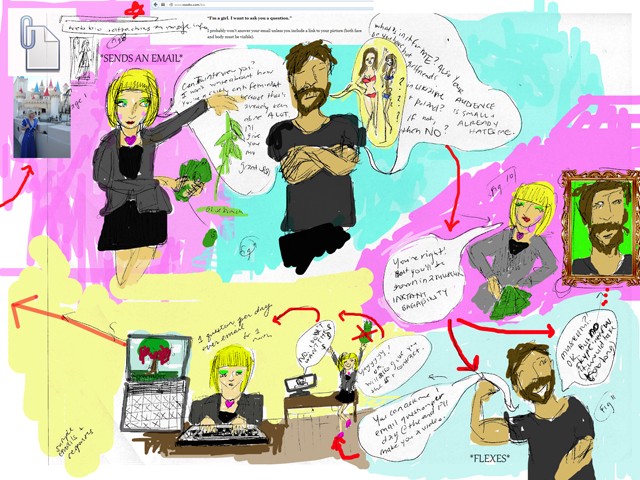
When in your research process did you realize you wanted to try and track down women on the receiving end of Roosh’s advances? I feel like it’s one of those things that seems quite obvious but would never have occurred to me.
It was after I finished reading BANG. I was combing through Roosh’s website, and after reading his blog entries The British Virgin and Anna, I couldn’t help but think about their side of his mythology. I thought it would be nice to have companion texts for his approximations of these women. Then, as I read more and more accounts of Roosh’s conquests from his perspective, I felt a call to find women who have been on the other side of his pickup approaches and on the receiving end of his dick to have their experiences and perspectives given some attention…even if they were consistent with his stories. It also stemmed from the desire to break down his performance on the Internet and challenge the myth of objectivity that much of his community clings to, destabilizing his carefully crafted narratives by introducing other complicating voices.
Part of your work seems to be this kind of persistent insertion of feminism into blatantly anti-feminist spaces. Is this something you specifically set out to do with your art?
I think one of the ongoing problems that feminism is having, especially in this moment of extreme Internet-based enclaves/safe spaces/dark corners, is that it’s often publicly perceived as belonging to a group of overly educated but underexperienced 20-somethings with Tumblrs talking about how hard it is to be a woman, and that the battle should be over because women already have “equality.” I constantly get this as a definition from players in WoW, and Roosh also mentioned this.
A lot of these people admittedly have also never had a conversation with a self-identified feminist, and so it is easier for them to abstract feminists into a lump of entitled, academic, unrealistic women whom think they should be placed on a pedestal.
What I’m trying to do is get in there where these stereotypes are the most prevalent and the environment for feminists is most hostile, and try to open up a more generous and empathetic conversation across polarized communities so we can address structural issues that create all of these oppositional worldviews. It is some big-picture thinking and not realistic for me to do this on my own, but I figure I can try to make a dent. I never “push an agenda” in my conversations with players in WoW or even with Roosh V…and even if I do disagree with their sentiments (and most often do), I try to create a platform to discuss them publicly.
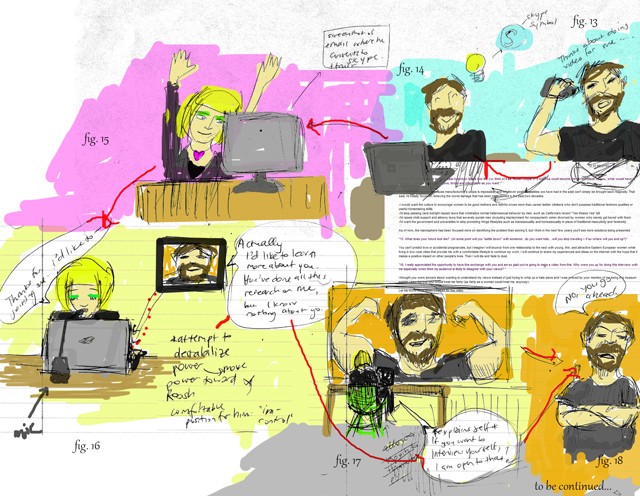
Something that strikes me about this project — similarly to the WoW project — is how big and open-ended it is, almost to the point of seeming impossible. Do you have an end in mind, or will you simply keep at it until you find at least some women who’ve slept with Roosh?
I think in both The Council on Gender Sensitivity and Behavioral Awareness in World of Warcraft and what I’m working on with Roosh V, I thought I had a goal in the beginning, but at some point the projects took unexpected turns. As I did experiential research I realized that both realms were more complicated than I had initially imagined, and I had to adjust my approach and output accordingly.
Right now, I am starting an experimental documentary project and a live performance on the process of trying to find women who have slept with Roosh V. I have an upcoming solo exhibition at San Diego Art Institute in which I will present the interview, timelines, maps of where Roosh has been practicing his seduction techniques based on his books and blog texts dating back to DC Bachelor, diagram drawings, and more. Anyway, this is a bigger project than I initially imagined, and I am seeing it through right now and allowing this semi-intuitive obsession with BANG to be my guide for a little while…
Have you found any women yet? How have you been going about finding women?
It took a long time to work out the strategy for the “how” part of finding women that have had encounters with Roosh V. I’ve just started the process of looking. No one has come forward yet. I am hoping to use opportunities like this to distribute my call for women. I’ve been posting on the Craigslist pages of cities Roosh has spent time in. I’ve also posted on Reddit. I’ve been collecting images of him with women online (which are somewhat rare actually, and mostly from when he was younger) and have been trying to track down women from those photos. I intend to email authors of the hate-essays that have been written about him in Iceland and Denmark to see if they will distribute my call. I’m also going to make a trek to Washington, DC (where Roosh got his start), and go into places he may have frequented with photos of him and ask around. I’m also in the process of sending WANTED-style posters to friends in Denmark, Poland, Finland, Iceland, and elsewhere to try and distribute the word.
I know it will be difficult, and I know that some women may be embarrassed at having been duped by a seduction author/pickup artist and as Roosh rightly concluded: many women are likely not interested in sharing the details of their personal sex lives with me, even if made completely anonymous. Not everyone wants their private lives made public. I understand that. Also, all of Roosh’s work could be part of an elaborate and performative mythology, so I may not find anyone because there literally isn’t anyone to find.
But if you, reader, have ever had an exchange with this man, please contact me at [email protected] to share your experience anonymously without judgment!
Jillian Steinhauer is the senior editor of Hyperallergic and a writer living in Brooklyn. She loves cheese, art, baked goods, cats, and comics, in no particular order. You can visit her website and/or follow her on Twitter.